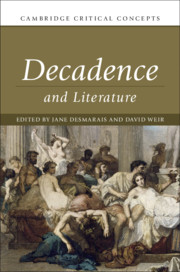Book contents
- Decadence and Literature
- Cambridge Critical Concepts
- Decadence and Literature
- Copyright page
- Dedication
- Contents
- Figures
- Contributors
- Acknowledgements
- Introduction
- Part I Origins
- Part II Developments
- Part III Applications
- Chapter 16 Decadence and Urban Geography
- Chapter 17 Socio-aesthetic Histories: Vienna 1900 and Weimar Berlin
- Chapter 18 Decadence and Cinema
- Chapter 19 Transnational Decadence
- Chapter 20 Decadence and Modernism
- Chapter 21 Modern Prophetic Poetry and the Decadence of Empires: From Kipling to Auden
- Chapter 22 The Gender of Decadence: Paris-Lesbos from the Fin de Siècle to the Interwar Era
- Chapter 23 Decadence and Popular Culture
- Select Bibliography
- Index
- References
Chapter 22 - The Gender of Decadence: Paris-Lesbos from the Fin de Siècle to the Interwar Era
from Part III - Applications
Published online by Cambridge University Press: 12 August 2019
- Decadence and Literature
- Cambridge Critical Concepts
- Decadence and Literature
- Copyright page
- Dedication
- Contents
- Figures
- Contributors
- Acknowledgements
- Introduction
- Part I Origins
- Part II Developments
- Part III Applications
- Chapter 16 Decadence and Urban Geography
- Chapter 17 Socio-aesthetic Histories: Vienna 1900 and Weimar Berlin
- Chapter 18 Decadence and Cinema
- Chapter 19 Transnational Decadence
- Chapter 20 Decadence and Modernism
- Chapter 21 Modern Prophetic Poetry and the Decadence of Empires: From Kipling to Auden
- Chapter 22 The Gender of Decadence: Paris-Lesbos from the Fin de Siècle to the Interwar Era
- Chapter 23 Decadence and Popular Culture
- Select Bibliography
- Index
- References
Summary
Paris from 1900 to 1940 experienced a remarkable revival of artistic culture, including surrealism in poetry and painting, poetic realism in cinema, and much more. Parallel with these developments are the lesser-known but equally remarkable activities of the ‘women of the left bank’ who gave expression to same-sex concerns in both their poetry and their lives and so form the socio-cultural tradition known as ‘Paris-Lesbos’. The tradition is one legacy of fin-de-siècle decadence whose principal practitioners are Renée Vivien (pseudonym of Pauline Tarn), translator of Sappho and decadent poet, and Natalie Barney, the multi-millionaire heiress and unashamedly self-proclaimed lesbian whose literary connections and love affairs placed her at the centre of the legend of ‘Paris-Lesbos’. Their work involves a complex intersection of decadence, ‘sapphism’, and ‘sapphic fiction’ and includes the feminist and lesbian reappropriation of Sapphic decadence at the turn of the century and a later revival of the decadent mystique of the lesbian as a ‘femmes damnée’ in the 1920s and 1930s.
- Type
- Chapter
- Information
- Decadence and Literature , pp. 362 - 378Publisher: Cambridge University PressPrint publication year: 2019
References
- 1
- Cited by

